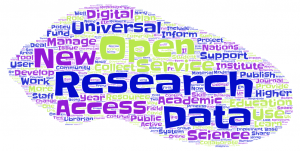The Academic and Research Libraries (ARL) section of IFLA brings together librarians from around the globe and together we “monitor current and emerging issues and their relevance to academic and research libraries … and …. disseminate information and recommendations, including results of relevant research and experiences of practitioners.” (IFLA, Academic and Research Libraries ). There are many ways in which we do this. Examples include WLIC sessions, webinars, and through this blog. Another forum available to members is the annual exercise of submitting “Regional Updates” of issues and initiatives from the members’ countries. These are packed with ideas and information that can inspire all kinds of action for us collectively or in our home institutions and countries. As this year approaches to its end, let’s a tour of some of the themes and highlights that emerged over a longer period of time: 2015-2021.
There is a wealth of information contained within these years and likely deserving of a much longer piece, but I have pulled out some of the emergent themes across the period and around the globe. Over the seven years covered, we have regional input from 29 different countries – with a certain bias, as these notes are disproportionately representative of regions in the geographic global North with most from Europe, the United Kingdom, and North America. The themes I’ve identified are ones that emerge across all members’ regions.
With so much data, I started the following visualization:
These words speak to us: research, open, service, access, data, universal, and new. I’ve clustered our updates into the following “large tent” themes: collaboration; digital libraries, open scholarship; equity, diversity & inclusion; and learning.
Collaboration:
Libraries collaborate regionally, nationally, and internationally building infrastructure, preserving content, and advocating. A common way we do so is through national consortia. The National and State Libraries of Australasia (NSLA) commit to shared digital systems for collection access (NED) and in Nigeria, The Association of University Librarians of Nigerian Universities (AULNU), is a forum for policy formulation and resource sharing. We also participate in our universities’ partnerships (e.g. Enlight) and with other national research infrastructure agencies (e.g. The Digital Research Alliance of Canada ; Nationale Forschungsdateninfrastruktur in Germany)
Digital Libraries:
2020 was designated as the Year of Digital Culture in Estonia and this is indicative of the ever growing role of libraries in digital research and scholarship. Our collective activities encompass Digital Humanities, Artificial Intelligence (AI), data management, and digitization and preservation. Our updates are replete with examples of activity in all of these areas as well as a recognition that we need to be growing our knowledge and skills. Arising from this are concomitant issues regarding privacy, security of data, complex copyright issues, and the ongoing problem of the digital divide both between and within countries.
Open Scholarship:
From 2015 to 2021 there were increasingly rich updates about open scholarship including open science, open access to research data and publications, open education resources, and citizen science. Slovenia’s National Strategy for Open Access to Scientific Publications and Research Data, 2015-2020 is a standard example of national and regional requirements for open access to publicly funded research. Similarly, the Botswana Open Data Open Science (ODOS) national committee’s mandate of facilitating open data readiness was a common response at national levels to open data imperatives. The November 2021 ARL blog post is a great read on citizen science in Denmark.
Equity, Diversity, and Inclusion:
EDI is a shared value which is evident throughout the ARL member updates. In Australia, New Zealand, Canada, and the United States there is ongoing action to decolonize libraries and work towards reconciliation. The National and State Libraries of Australasia (NSLA) hosts the Culturally Safe Libraries Program and The Canadian Federation of Library Associations (CFLA) released The Truth and Reconciliation Committee Report and Recommendations. An EDI lens is being applied to collections, services, and staffing in all countries. The 2020 update from the United States describes how the “senseless killing of Black Americans called for research libraries in the U.S. to address inequality and systemic racism”.
Learning:
Academic and research libraries are learning institutions and as such we devote a lot of attention to our own development and to that of our students and researchers. Many countries report on the need to develop sophisticated digital skills within library staff and the importance of being able to recruit people with them. An update from Germany reminds us that we increasingly will have to compete with the private sector for such individuals. Attention is also paid to the skills needed by library leaders to facilitate the future digital library.
In an age of prevalent disinformation and misinformation, information literacy has taken on a new edge and critical urgency. Academic libraries are addressing this in curricular and extra-curricular teaching. A creative approach from South Africa is an initiative to reimagine information literacy mapped against the research lifecycle – a perfect melding of learning and research.
Finally, about COVID: the last two years of submissions were filled with the challenges and the opportunities that the pandemic brought us. Many countries had robust digital infrastructure to rely on, while others experienced more acute challenges. There is a sense though that the pandemic is ultimately another catalyst to keep us moving faster towards the digital, open, and equitable libraries we strive to build.
These themes are just a sampling of our activities and truly the tip of the ARL iceberg. They demonstrate our common values and our commitment to work together to achieve them.
Sharon Murphy
Associate University Librarian
University of Alberta
Edmonton, Canada
[email protected]
